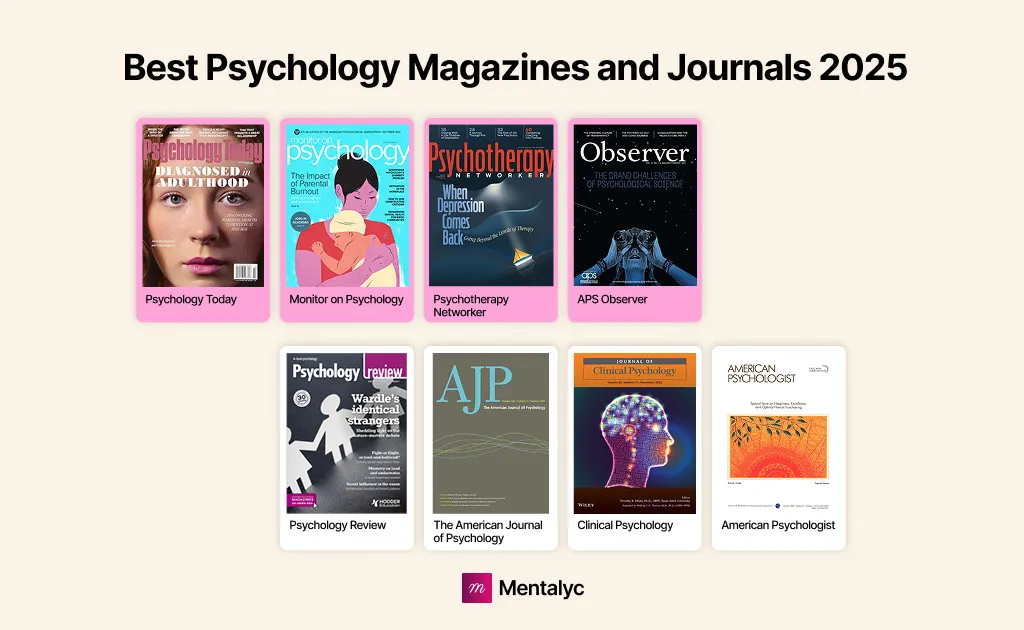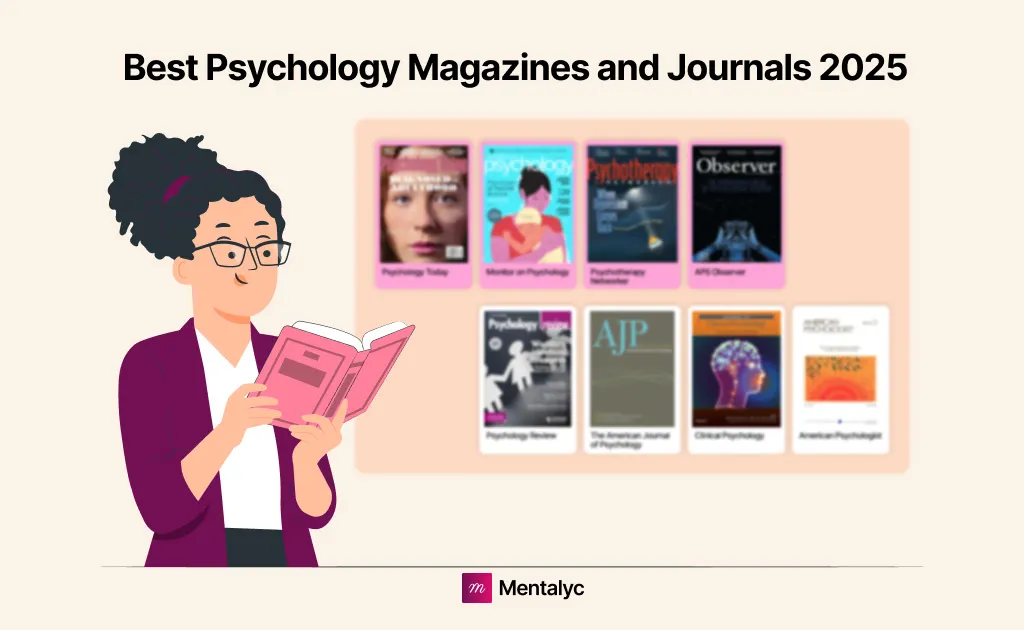Staying updated with the best psychology magazines & journals for psychologists is essential in a field that evolves as rapidly as ours. With thousands of new studies published each year and countless publications to choose from, it can be difficult to know where to focus your time and attention. Whether you’re seeking cutting-edge research, practical clinical insights, or accessible writing that enriches your therapeutic work, the right publications can elevate both your knowledge and your practice.
To save you the search, this article highlights ten of the most respected psychology journals and magazines that every psychologist can benefit from – whether you’re deep into research, running a private practice, or simply staying current with the latest in mental health science.
Also, to make continued learning easier, tools like Mentalyc AI Note Taker can support your professional growth by streamlining documentation and giving you more time to engage with meaningful research.
Why Reading Psychology Journals Matters
The field of psychology is fast-paced and constantly changing, so staying current on continuously evolving research can be overwhelming. If you do a web browser search for psychology magazines and journals, you will receive hundreds of results.
Yet, with thousands of studies published every year, it’s easy to feel overwhelmed or unsure where to focus. Curated, reliable sources make it easier to grow professionally without drowning in information.
So how to keep growing professionally? Here at the Mentalyc Blog, we curate practical, evidence-based insights tailored for mental health professionals. And with our tools like Alliance Genie™, you can take that learning even further — gaining supervision-like insights from every session to strengthen your clinical skills and therapeutic awareness.
Many clinicians also rely on structured systems like the AI Progress Tracker by Mentalyc to observe measurable outcomes over time, helping connect research findings to real-world client progress.
How to Choose the Right Psychology Journal
If you pursue continued self-education, you may turn to magazines, podcasts, journals, and other timely resources to stay current on the ever-changing field of psychology and behavioral health. To identify the top psychology publications for your unique professional interests and areas of expertise, here is a reference guide of ten popular publications covering different aspects of the field of psychology. Consider exploring this psychology magazine list, whether you are looking for light reading or a deeper dive.
Top Psychology Magazines and Journals for 2025

Best Non Peer-Reviewed Psychology Journals
Psychology Today
First Published: 1967, Sussex Publishers Bimonthly; general psychology and human behavior Peer-Reviewed? No
Psychology Today is one of the most widely read psychology magazines, featuring insights from leading psychologists and psychiatrists across diverse fields. It offers accessible content on emerging research, therapeutic techniques, and real-world mental health topics. It’s a trusted resource for professionals and anyone interested in understanding the human mind.
APS Observer
First Published: 1988, Association of Psychological Science Bimonthly; psychology-related issues of national significance, general psychology Peer-Reviewed? No
The APS Observer, the flagship publication of the Association for Psychological Science, has grown from a simple newsletter into a dynamic magazine that bridges academic research and real-world application. It covers emerging trends in psychology, social issues, and policy, offering accessible insights that help professionals stay informed and engaged with the evolving science of psychology.
APA Monitor on Psychology
First Published: 2000, American Psychological Association (APA) Monthly; psychological research, general psychology Peer-Reviewed? No
The APA Monitor on Psychology is the American Psychological Association’s flagship magazine, offering an accessible look at both the science and practice of psychology. It covers new research, teaching innovations, and real-world applications, helping educators and practitioners stay current with evolving methods and insights. The Monitor also highlights psychology’s impact on society, making it a trusted source for the latest news and trends in the field.
Psychotherapy Networker
First Published: 1977, Psychotherapy Networker Bi-monthly; therapeutic techniques, clinical strategies, ethics, practice management Peer-Reviewed? No
Psychotherapy Networker is a leading magazine for mental health professionals, offering practical insights on therapeutic techniques, ethics, and practice management. It helps therapists stay current with emerging trends and best practices, serving as a trusted resource for professional growth and deeper understanding of the evolving world of psychotherapy.
Best Peer-Reviewed Psychology Journals
Psychological Review
First Published: 1894, American Psychological Association (APA) Quarterly; psychological theory Peer-Reviewed? Yes
The Psychological Review is one of the most prestigious and influential journals in psychology, known for advancing theoretical research and shaping the field’s foundational concepts. Published by the APA, it features rigorous, thought-provoking articles that push the boundaries of psychological science. It’s an essential read for researchers, academics, and professionals seeking cutting-edge insights into human behavior and theory.
American Journal of Psychology
First Published: 1887, University of Illinois Press Quarterly; experimental psychology Peer-Reviewed? Yes
The American Journal of Psychology (AJP) is one of the oldest and most respected journals in experimental psychology. Published by the University of Illinois Press, it focuses on advancing research in behavior, cognition, and perception. Known for its groundbreaking studies and theoretical contributions, the AJP remains a vital resource for researchers and students seeking to stay current with innovations in experimental psychology.
APA Psychological Bulletin
First Published: 1904, American Psychological Association (APA) Monthly; psychological research, scientific psychology Peer-Reviewed? Yes
The Psychological Bulletin, published by the APA, is a highly respected peer-reviewed journal known for its comprehensive research reviews and meta-analyses. Renowned for its scholarly rigor and high citation rate, it serves as a trusted reference for psychologists seeking in-depth analyses of theories, methods, and findings that shape the field.
Journal of Clinical Psychology
First Published: 1945, Wiley-Blackwell Monthly; clinical psychology, psychological research Peer-Reviewed? Yes
The Journal of Clinical Psychology is a leading peer-reviewed publication dedicated to advancing research, assessment, and clinical practice. Covering topics such as psychopathology, diagnostics, and psychotherapy, it provides clinicians and researchers with evidence-based insights that enhance treatment effectiveness and patient outcomes.
Journal of Consulting and Clinical Psychology
First Published: 1937, American Psychological Association (APA) Monthly; clinical psychology Peer-Reviewed? Yes
The Journal of Consulting and Clinical Psychology (JCCP) serves as a dedicated platform for chronicling and disseminating the latest advancements in clinical psychology. It bridges research and practice by publishing studies relevant to both clinical scientists and practitioners, emphasizing the roles of culture, personality, and demographics in treatment outcomes.
American Psychologist
First Published: 1946, American Psychological Association (APA) 9 publications/year; high-impact issues related to national/international significance Peer-Reviewed? Yes
Whether you are a psychologist or a behavioral health practitioner seeking to remain well-informed about the latest high-impact studies in your field, the American Psychologist emerges as an exceptional choice for as a psychology publications for professionals. Known for its global scope and high-impact research, it provides professionals with valuable insights into emerging trends and breakthroughs across the discipline.
Comparison of Top Psychology Journals and Magazines (2025)
| Publication Name | Publisher / Organization | First Published | Frequency | Focus Areas | Peer-Reviewed | Audience / Notable Features |
| Psychology Today | Sussex Publishers | 1967 | Bimonthly | General psychology, human behavior | No | Widely read magazine offering accessible insights, trends, and expert commentary in mental health and therapy. |
| APS Observer | Association for Psychological Science | 1988 | Bimonthly | Academic research, applied psychology, policy | No | Covers research updates and social issues intersecting psychology; flagship publication of APS. |
| APA Monitor on Psychology | American Psychological Association (APA) | 2000 | Monthly | Psychological science, education, and practice | No | Highlights latest research, practical applications, and societal impacts of psychology. |
| Psychotherapy Networker | Psychotherapy Networker | 1977 | Bimonthly | Therapeutic techniques, ethics, clinical practice | No | Resource for therapists focused on trends, ethics, and effective treatment methods. |
| Psychological Review | American Psychological Association (APA) | 1894 | Quarterly | Psychological theory, conceptual frameworks | Yes | Prestigious theoretical journal offering deep insights into evolving psychological models. |
| American Journal of Psychology (AJP) | University of Illinois Press | 1887 | Quarterly | Experimental psychology, cognition, behavior | Yes | Pioneering publication advancing research on experimental and cognitive psychology. |
| APA Psychological Bulletin | American Psychological Association (APA) | 1904 | Monthly | Research reviews, meta-analyses, scientific psychology | Yes | High-impact journal known for comprehensive research syntheses; heavily cited. |
| Journal of Clinical Psychology | Wiley-Blackwell | 1945 | Monthly | Clinical psychology, psychodiagnostics, therapy | Yes | Focuses on clinical practice, psychopathology, and therapeutic innovations. |
| Journal of Consulting and Clinical Psychology (JCCP) | American Psychological Association (APA) | 1937 | Monthly | Diagnosis and treatment of behavioral disorders | Yes | Explores cultural, demographic, and personality factors in clinical treatment. |
| American Psychologist | American Psychological Association (APA) | 1946 | 9 issues/year | Psychological science, policy, education, practice | Yes | High-impact journal addressing psychology’s most influential national and international research topics. |
Consider the Costs of Subscriptions
It’s important to note that most magazines and journals require a subscription or access through a university or institution. Psychologists should consider their specific needs and access options when choosing the most suitable periodicals.
The cost of subscriptions can vary widely depending on several factors, including the type of journal, the publisher, the subscription model, and the access level. Here are some key points to consider:
Subscription Cost Factors for Psychology Journals
| Cost Factor | Description | Impact on Subscription Price | Notes |
| Subscription Model | Two main types: individual and institutional. | Individual subscriptions are typically higher; institutional plans cover multiple users at lower per-user cost. | Universities often use institutional access to reduce expenses. |
| Type of Journal | Varies by prestige, impact factor, and specialization. | High-impact journals cost more; open-access models may charge authors instead. | Psychological Review is pricier than smaller niche journals. |
| Publisher Policies | Each publisher sets its own pricing and bundling structure. | Bundled packages can lower costs; single-journal pricing is often higher. | APA and Wiley often offer discounted journal bundles |
| Access Level | Determines what content subscribers can view. | Full archive and current-issue access is more expensive than partial or delayed access. | Limited plans may exclude recent issues. |
| Online vs. Print | Delivery format (digital or physical). | Online-only access is generally cheaper; print versions add production and shipping fees. | Many journals have shifted to digital-only models. |
| Society Memberships | Access through professional associations or organizations. | Membership often includes free or discounted journal access. | APA or APS members receive complimentary or reduced access. |
| Interlibrary Loan Services | Occasional article borrowing through library networks. | Low-cost for occasional use; not ideal for frequent researchers. | Best for one-off article requests. |
| Negotiations and Consortia | Institutions negotiate or join collective agreements. | Consortia and bulk negotiations lower institutional rates. | Libraries often collaborate for better pricing. |
| Budget Constraints | Allocation based on available funding and research priorities | Researchers or departments may need to limit subscriptions. | Prioritize journals most relevant to research focus. |
Open Access and Subscription Options
Open access psychology journals and repositories offer free access to a wide range of psychology research. While they may not cover all topics or have the same prestige as subscription-based journals, they provide an accessible alternative.
There is growing awareness and discussion within the academic community about the rising costs of subscriptions and the need for more open-access alternatives to ensure wider dissemination of research. Many funding agencies and institutions are exploring ways to address these challenges and make research and clinical psychology journals more accessible to all.
Carefully evaluate your specific needs and budget when deciding which psychology journals and magazines to subscribe to. Explore alternative access options to effectively manage costs. Remain informed about changes in the publishing landscape, such as open-access initiatives and consortium agreements, to help in making cost-effective choices.
Final Thoughts: Staying Current in Psychology
Each psychology journal and magazine offers a unique lens into the evolving world of psychological science. Staying informed isn’t just about curiosity—it’s part of professional growth and ethical practice.
Balancing clinical work, research, and administrative demands can make it challenging to keep up with new insights. That’s where smart tools and efficient systems come in. Solutions like Mentalyc help streamline documentation by automatically generating compliant and clinical soundly notes – freeing up time for continuous learning, ensuring you stay connected to the latest research and trends. Morever, with tools like Alliance Genie™, therapists can also gain supervision-like insights from each session, turning daily practice into a source of clinical growth and inspiration.
Disclaimer
All examples of mental health documentation are fictional and for informational purposes only.
FAQs about Best Psychology Magazines and Journals for Psychologists
What are the best magazines or journals on psychology?
The best psychology magazines and journals include Psychology Today, APA Monitor on Psychology, Psychotherapy Networker, Psychological Review, American Journal of Psychology, and Journal of Clinical Psychology. These publications combine accessibility with research-based insights for mental health professionals and students.
What is the most respected psychology journal?
The Psychological Review is widely regarded as the most respected psychology journal. Published by the American Psychological Association (APA), it features theoretical and conceptual papers that shape modern psychological science.
What is the largest psychology magazine?
Psychology Today is the largest and most widely read psychology magazine globally. It offers accessible articles written by psychologists, psychiatrists, and researchers, covering mental health, behavior, and human relationships.
What journal has the highest impact factor?
Among psychology publications, the Annual Review of Psychology and Psychological Bulletin consistently hold the highest impact factors due to their comprehensive research reviews and high citation rates.
What is The Psychologist magazine?
The Psychologist is the official monthly publication of the British Psychological Society (BPS). It covers news, opinion pieces, and applied research insights for professional psychologists and psychology students.
What is the most renowned scientific journal?
Globally, Nature and Science are the most renowned scientific journals. Both publish groundbreaking research across disciplines, including neuroscience, psychology, and behavioral science.
What is the most reliable psychology website?
The most reliable psychology websites include APA.org (American Psychological Association), BPS.org.uk (British Psychological Society), and Psychology Today. These sources provide verified, evidence-based information for mental health professionals and the public.
What is the most prestigious award in psychology?
The APA Award for Distinguished Scientific Contributions is considered the most prestigious award in psychology. It honors psychologists whose research has significantly advanced the understanding of behavior and mental processes.
For updates on new research highlights and curated reading lists, follow Mentalyc on Facebook & Instagram.
Why other mental health professionals love Mentalyc

“If I were recommending this software to a colleague, I would tell them that it is the best thing that they could do for their practice.”
Licensed Professional Counselor

“For anyone hesitant: this is a lifesaver. It will change your life, and you have more time to be present with your patients.”
Licensed Clinical Social Worker

“It immediately changed my quality of life, personally and professionally.”
Owner/Independently Licensed Marriage & Family Therapist (LMFT)

“Do yourself a favor, make your life easier. I found Mentalyc to be one of the best tools that I’ve ever used.”
Licensed Marriage and Family Therapist






